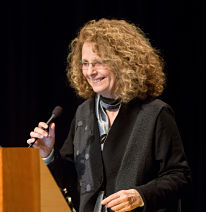Jessica Benjamin, Ph.D., presented her theories as part of Adelphi’s 2015 Lindemann Lecture in Human Development.

Jessica Benjamin, Ph.D.
by Lauren Knopf
Conflict, pain and disappointment are as much a part of human relationships as joy, communion and love. How can we navigate the difficult moments, and the divisive emotions they engender, in a way that leads to restoration of bonds?
Acclaimed psychoanalyst Jessica Benjamin, Ph.D., addressed this subject with sensitivity and nuance in her paper, “Only One Can Live: The Fear of Harming and the Need for Repair,” presented as part of Adelphi University’s Lindemann Lecture in Human Development on March 6, 2015, in New York City. The event was hosted by Adelphi’s Gordon F. Derner Institute of Advanced Psychological Studies.
Dr. Benjamin’s paper centered on her notion of the moral third, which describes the implicit expectations that develop between two people and come to govern their interactions. Just as laws establish the actions a society regards as criminal, the moral third defines the acts that violate the bond between two people. In relationships, the key is not to act infallibly—an impossible feat—but rather to acknowledge when the bond has been violated and share in the other’s suffering. Dr. Benjamin’s idea contrasts with the tendency to view interpersonal rifts exclusively along dichotomous lines, where one person is seen as wholly good and the other as the one responsible for what has happened. Instead, she offers a third way, one that recognizes that no one is wholly good or wholly bad, and further that hurts cannot be erased but may be repaired if suffering is jointly acknowledged and validated.
Dr. Benjamin noted that this alternative way of thinking about interpersonal ruptures is especially important in the unique two-person dynamic that is constructed in therapy. Patients often bring a set of negative expectations about relationships learned in childhood, and therapists may fear damaging rather than healing their patients in the process of bringing attention to these patterns. By acknowledging that they are capable of both hurting and healing, therapists overcome the fear of harming patients. When ruptures are established as a matter of shared concern, patients are relieved of the burden of solitary suffering and develop faith in the possibility of repair.
An enthusiastic audience engaged Dr. Benjamin in a lively Q&A following her presentation.
For further information, please contact:
Todd Wilson
Strategic Communications Director
p – 516.237.8634
e – twilson@adelphi.edu